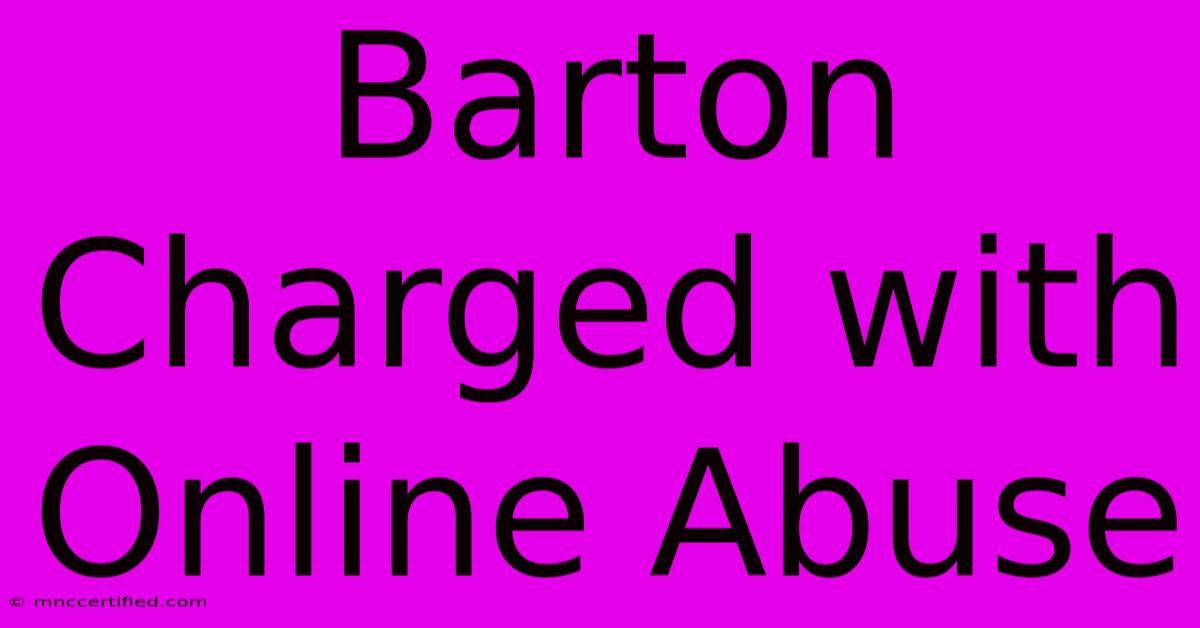Barton Charged With Online Abuse

Table of Contents
Barton Charged with Online Abuse: A Deep Dive into the Case
The recent charges against [Barton's Full Name], a [Barton's Profession/Public Figure Status], for online abuse have sent shockwaves through [Relevant Community/Industry]. This article delves into the details of the case, exploring the allegations, the legal ramifications, and the broader implications of online harassment.
The Allegations Against Barton
[Barton's Full Name] has been charged with [Specific Charges, e.g., cyberstalking, harassment, online defamation]. The allegations stem from a series of [Type of Online Interactions, e.g., social media posts, emails, online comments] targeting [Victim's Name or Description, e.g., a former colleague, a journalist, a group of individuals]. These interactions allegedly included [Specific Examples of Abusive Behavior, e.g., threats of violence, hateful language, the dissemination of private information]. The prosecution claims these actions caused [Impact on the Victim, e.g., significant emotional distress, reputational damage, fear for their safety].
Evidence Presented
The prosecution is reportedly relying on [Types of Evidence, e.g., screenshots of online interactions, witness testimonies, digital forensic analysis] to support their case. Specific details about the evidence remain sealed, but reports suggest [Mention any publicly available details about evidence, e.g., the number of abusive messages, the duration of the alleged harassment]. The defense, represented by [Defense Attorney's Name, if known], has yet to publicly comment on the specifics of the evidence.
Legal Ramifications and Potential Outcomes
The charges against Barton are serious and carry significant potential penalties. Depending on the jurisdiction and the specific charges, these penalties could include [Potential Penalties, e.g., hefty fines, imprisonment, community service, restraining orders]. The case will likely hinge on [Key Legal Arguments, e.g., the interpretation of relevant laws concerning online harassment, the definition of "abuse" in a digital context, the admissibility of certain types of evidence].
The Role of Social Media Platforms
This case highlights the crucial role of social media platforms in combating online abuse. Platforms like [Name platforms involved, e.g., Twitter, Facebook, Instagram] are increasingly facing pressure to take more proactive measures to prevent and address online harassment on their platforms. This case could set a legal precedent for how these platforms are held accountable for content shared on their sites.
The Broader Impact of Online Abuse
Barton's case underscores the pervasive and damaging nature of online abuse. The anonymity and reach of the internet often embolden perpetrators, leading to significant harm for victims. This case serves as a stark reminder of the need for:
- Increased awareness: Educating individuals about the forms and impacts of online abuse.
- Stronger legal frameworks: Developing and enforcing laws that effectively address online harassment.
- Improved platform accountability: Holding social media platforms responsible for creating safer online environments.
- Victim support: Providing resources and support for individuals who have experienced online abuse.
Conclusion: A Call for Change
The Barton case is more than just a legal battle; it's a reflection of a larger societal issue. The widespread nature of online abuse demands a multifaceted response, encompassing legal action, platform accountability, and a cultural shift towards greater online empathy and respect. As the case unfolds, it will be crucial to monitor the legal proceedings and their implications for addressing online harassment in the future. This case serves as a crucial reminder that actions online have real-world consequences.
Keywords: Barton, online abuse, cyberstalking, harassment, online defamation, social media, legal ramifications, victim support, online safety, digital abuse, legal precedent, social media accountability.
Note: This article is a template. Replace the bracketed information with accurate details about the specific case. Remember to cite all sources used. Furthermore, consider adding links to relevant legal resources and support organizations for victims of online abuse. Always verify the accuracy of information before publishing.

Thank you for visiting our website wich cover about Barton Charged With Online Abuse. We hope the information provided has been useful to you. Feel free to contact us if you have any questions or need further assistance. See you next time and dont miss to bookmark.
Featured Posts
-
Living Near Constant Reminders Neighbors Impact
Dec 18, 2024
-
Nissan Honda Explore Merger
Dec 18, 2024
-
Stream Nba Cup Finals Tonight
Dec 18, 2024
-
Cavendish Academy Rejection Cycling Triumph
Dec 18, 2024
-
Nba Prize Picks Tuesday Player Predictions 12 17
Dec 18, 2024